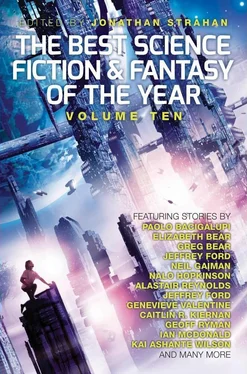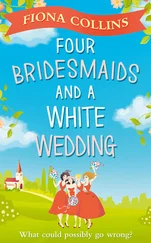After dinner, the pale-skinned daughters dragged their father off to help them with something and Belle and Clara were left alone in the mudhole. The solar fairy lights were starting to dim, but the citronella candles threw off more than enough light. Belle stretched herself out, her feet in the cool spot where Robert had been sitting.
“I should go,” Clara said, and Belle turned and reached out as if to stop her. “Don’t go,” Belle said. “Nobody else gets a word in once Rob gets going.” Clara saw how it was. How Belle was in no hurry to be left alone with Robert after their evening of high talk and laughter. How he was the kind of male who was roused by such things into something like rage. Belle was weary, and filled with the kind of dread that comes when a party is over and you see, all at once, all the damage you must now repair.
CLARA AND BELLE were both of that generation who were unlikely to have grandchildren, though they had both had husbands and children of their own. They were the mothers of daughters they did not understand, and whose troubles they could barely recognise. They went in and out of each other’s houses on a daily basis. They would graze in the savannah, or stand side by side in the kitchen making bread and listening to Belle’s daughters talk about their lives. The jokes about being the last of their kind. The bullying and despair. The gossip and conspiracies. A female in another herd had had a child, but it had died after one year. Another had given birth to three at once, stillborn and pale as cake. Clara and Belle looked at each other and twitched their ears in silent amazement. Who were these females? What lives were they living?
“Where did you hear that?” Belle said. “Facebook? It sounds like a hoax. Fear-mongering.”
The girls said it didn’t matter if one particular story was true or not, the point was not that one female had bred or not, but that they would never have children of their own. And if they did, they would be outcasts. “We’d stay friends, if one of us had a child,” said one of Belle’s daughters. “Sure,” said the other. “We’d set up a home and raise it together. Share it.”
“What about the bull?” said the younger daughter. “Would he have to live with us, too?”
Belle and Clara shared another of their looks, folded and pounded the dough they were working.
Belle’s older daughter shrugged. “You know what the males are like,” she said. “The ones who can breed are like... ugh.”
When they had talked enough about the future, the daughters talked about movies and music and the parties they were going to. Belle’s daughters were into bushwalking, and were always trying to drag their mother and Clara along on their week-long walks across the reserve. They talked about the places they would walk to next, and the things they planned to do when they got there.
Clara and Belle also worked together in the kitchen at the café. Or they went to other cafés to eat cake and drink coffee. They liked to sample the menus in the other cafés and consider the clientele. Sometimes, they would buy flat, sweet Dutch donuts from the baker, and get take-away coffee from the place next door to that, and then they’d go for a long walk along the beach together.
They talked, at first in a sidelong fashion, and later with increasing heatedness, about the males with whom they had paired, their children, the lives they still felt they might live.
Clara said that her husband had been the kind that, whenever they invited people for dinner, would insist that she spend the two days prior to their arrival cleaning the whole of their home from top to bottom. She would pull out the weeds along the pathways and pull out the saplings that were too hard or bitter to eat. Trample the path till it was good and wide, and gather extra food for everyone. “It got to the point it was just easier not to have guests,” she said. “By the time they arrived, I was too exhausted to enjoy their company.”
Belle said that she had found out Robert still wrote letters to his childhood sweetheart. One a week. And that the woman wrote back just as often.
“What do the letters say?” Clara asked.
Belle shrugged and looked away, squinting out to sea. “I don’t know. He keeps them in a toolbox in his solitary territory. I’ve never had the courage to read them. I can’t decide whether I want them to be in love still, or not.”
They looked at each other, and then they both laughed. It was ridiculous, wasn’t it? The way the ones that were meant to be the centres of their lives were so peripheral. It was their friendship with each other that was the true and central thing.
“I shouldn’t talk about him like this,” said Belle. “He’s a good enough husband.”
Clara nodded. “Mine was, too. He was alright, as far as husbands go.”
“Just not – I don’t know. It’s as though he’s given up. As though now that we know we’ll go extinct – there’s no point in paying attention to the lives we do have. The lives we’re living.”
“As if we’re already ghosts,” said Clara. “Already dead.”
“I’m going to leave him,” Belle said. “I can’t go on like this for much longer; living in the afterlife.”
AFTER THEY SEPARATED, Belle and her husband were friendly enough. He stayed in touch with the girls and was still often at their place, dropping them off or picking them up, mending this and that.
Belle spent most of her time at the café. She put in a herb garden, and then a vegetable patch. There was a vacant lot next door and it was soon overrun with pumpkins and nasturtiums, zucchini and tomato plants. She stopped wearing her bangles to work, and was often working in the garden, showing off her bare, strong shoulders and sturdy legs. She seemed younger every week, rather than older. Cleverer, too, and full of easy opinions about things. The customers who came into the café liked to talk to her about their own gardens, and their own efforts at baking this or that. They liked to walk beside her as she moved through the garden, pulling weeds or turning soil. In the middle of the day, if it was too hot and there were no customers to speak of, she would find a shady spot in the garden, spread out a picnic blanket and sit outside reading.
Sometimes, one of the customers would go out into the garden to see her; they would bring her an armful of rosemary, or a bucket of beets they had grown. These were always single females. They weren’t lonely, exactly, but they seemed to like to come and take up a corner of Belle’s blanket and talk.
Finally, one night after closing up late, Clara invited Belle to come to her house for a drink. Usually, Belle was busy in the evenings. She had the girls at home most nights, after all. But this time she said yes, and followed Clara up the long dirt road to her house.
Clara’s house was small but she had an earnest, quiet affection for it. It had a long, narrow room running all along one side – a closed-in verandah – which was her very own library. There were windows at both ends, but it was a cool, dark, narrow room. She had her desk in there, but it was mostly just bookcases. Floor to ceiling, wall to wall. In the early evening, it was flooded with a faint, stippled light that came in through the bush surrounding the house. The room, like the rest of the house, was very plain and tidy. Clara found this plainness comforting amid the flourishing chaos of the bush in which the house sat. The winding, shaded paths through the rainforest. The weedy, vine-strangled creek. Here, the books spoke their own quiet language.
One of the deep, unspoken pleasures of Clara’s life was to spend a whole day putting the books in order. She would catalogue everything like a real library, using the Dewey Decimal system, or order the books by colour and size. She would often lie on the cool concrete floor, with the reading lamp lit and her notebook at hand. Not reading, just waiting. It didn’t matter what book it was she was meant to be reading. None of what was in the books mattered, in a sense. The fact of their existence was enough.
Читать дальше












